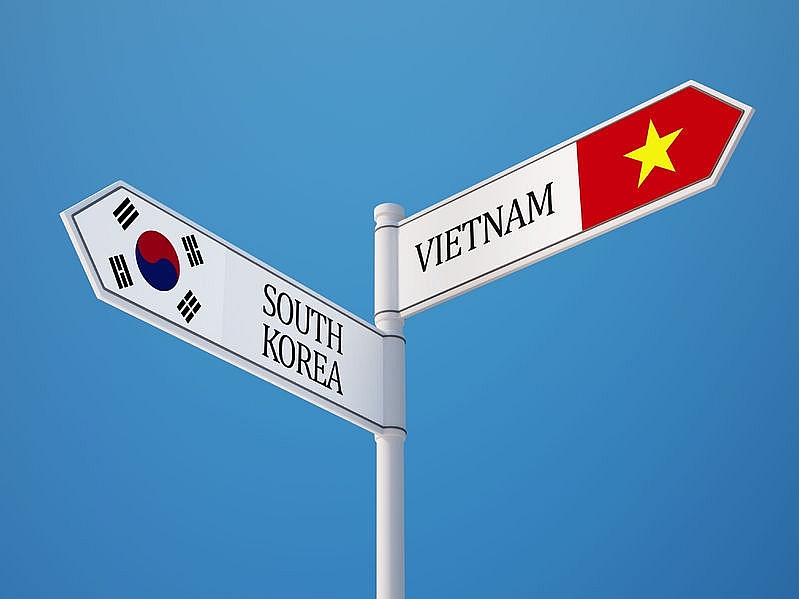Growing Korean influence in Vietnamese financial and banking market
 |
| The Vietnam’s financial and banking market welcomes Korean giants |
Recently, VietinBank Insurance Joint Stock Corporation (VBI) held the signing ceremony of a share purchase contract with Hyundai Marine & Fire Insurance Company Limited (HMFI). Accordingly, HMFI will purchase 25 per cent of VBI's charter capital, the number of additionally issued shares is more than 16.6 million to raise it charter capital to over VND666.6 billion ($28.98 million). At the event, VietinBank, which owns most of VBI, also signed a strategic cooperation agreement with HMFI.
VBI’s representative said that with this deal, the company will take advantage of HMFI’s relations to expand their reach among Korean and Vietnamese customers and partners.
HMFI is the second largest South Korean insurance firm in terms of market share.
Another deal expected is between BIDV and KEB Hana Bank, which currently holds $255 billion in assets and is the No.1 commercial bank in Korea. KEB Hana Bank has 134 foreign branches in 24 countries, mainly in Europe, the Middle East, the US, and especially in the Asia-Pacific region.
In October 2018, BIDV has consulted shareholders about selling 17.65 per cent of the shares (equivalent to 15 per cent after raising capital) to KEB Hana Bank. The number of shares expected to be issued is more than 603 million to increase its charter capital. After a successful issuance, BIDV's charter capital will increase to VND40.22 trillion ($1.75 billion).
The Vietnamese financial and banking market is still attractive to Korean financial giants. These two giants chose M&A to enter the market, while others compete directly with indigenous financial institutions through buying out financial companies or establishing new entities.
On December 18, Lotte Finance Vietnam officially joined the consumer lending market with consumer mortgage loans as its first product. Lotte spent over VND1.7 trillion ($73.91 million) purchasing Techcom Finance in March 2018.
With the support from the parent corporation, Lotte Finance Vietnam plans to develop instalment loans and credit cards in the near future, and is expected to launch its credit cards in the first half of 2019.
Up to now, the banking system in Vietnam has two fully-owned Korean institutions, Shinhan Bank and Woori Bank. Both are trying to expand their networks. In September, Woori Bank was approved to increase its charter capital to VND4.6 trillion ($200 million). In addition, the State Bank of Vietnam also allowed Woori Bank to open five more branches and one transaction office.
Not to be outdone, Shinhan Bank purchased the retail network of ANZ at the end of 2017. Shinhan Bank also opened four more branches in Vietnam, raising the total number of transaction points to 30 nationwide.
Another South Korean financial corporation that has a branch in Vietnam is Kookmin. At a meeting with Deputy Prime Minister Vuong Dinh Hue in early September this year, the bank's leader said that the corporation was promoting to complete procedures to open a branch in Hanoi and would invest more than $110 million. Previously, in 2017, Kookmin also spent more than $30 million to acquire Maritime Bank securities.
The influence of South Korean investors is on the rise in Vietnam not only in the banking and financial sector, but also in technology, retail, and even culture, sports, and tourism.
According to the Ministry of Planning and Investment, among the 74 countries and territories licensing investment projects in Vietnam in the first 11 months of 2018, Korea with $3.41 billion ranked second after Japan ($6.05 billion), accounting for 21.6 per cent of the total newly registered capital. Trailing far behind is Singapore with $1.1 billion, accounting for 7 per cent, and China with $892.9 million (5.7 per cent).
What the stars mean:
★ Poor ★ ★ Promising ★★★ Good ★★★★ Very good ★★★★★ Exceptional
Related Contents
Latest News
More News
- Japanese business outlook in Vietnam turns more optimistic (January 28, 2026 | 09:54)
- Foreign leaders extend congratulations to Party General Secretary To Lam (January 25, 2026 | 10:01)
- 14th National Party Congress wraps up with success (January 25, 2026 | 09:49)
- Congratulations from VFF Central Committee's int’l partners to 14th National Party Congress (January 25, 2026 | 09:46)
- 14th Party Central Committee unanimously elects To Lam as General Secretary (January 23, 2026 | 16:22)
- Worldwide congratulations underscore confidence in Vietnam’s 14th Party Congress (January 23, 2026 | 09:02)
- Political parties, organisations, int’l friends send congratulations to 14th National Party Congress (January 22, 2026 | 09:33)
- Press release on second working day of 14th National Party Congress (January 22, 2026 | 09:19)
- 14th National Party Congress: Japanese media highlight Vietnam’s growth targets (January 21, 2026 | 09:46)
- 14th National Party Congress: Driving force for Vietnam to continue renewal, innovation, breakthroughs (January 21, 2026 | 09:42)

 Tag:
Tag:


























 Mobile Version
Mobile Version